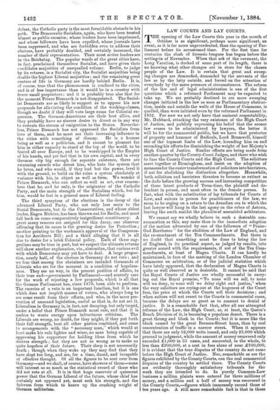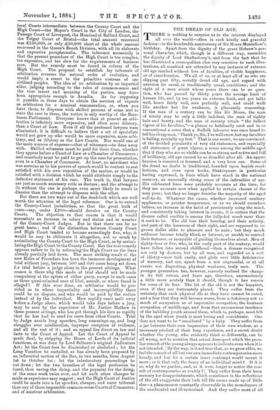LAW COURTS AND LAY COURTS. T HE opening of the Law
Courts this year in the month of October is as significant, perhaps more significant, an event, as it is far more unprecedented, than the opening of Par- liament before its accustomed time. For the first time for centuries the clash of forensic tongues has begun before the setting-in of November. When that ark of the covenant, the Long Vacation, is docked of some part of its length, there is no knowing what other changes are in store for the chosen people of the Law. It is certain that great and sweep- ing changes are demanded, demanded by the servants of the law as by the laity outside, and forced on the attention of everybody by the mere pressure of circumstances. The reform of the law and or legal administration is one of the first questions which a reformed Parliament may be expected to take up. We are probably destined to see more sweeping changes initiated in the law as soon as Parliamentary obstruc- tion, inside and outside the walls of the House of Commons, is quelled, than were initiated even by the reformed Parliament in 1832. For now we not only have that eminent respectability, Mr. Hubbard, attacking the very existence of the High Court of Justice, and publicly expressing his belief that the sooner law ceases to be administered by lawyers, the better it will be for the commercial public, but we have that protector of property and hammer of Radicals, Lord Bramwell, himself one of the topmost limbs of the Law, hounding him on and seconding his efforts for diminishing the weight of her Majesty's High Court of Justice. Similar efforts are being made from another quarter by the County-Court Judges, and those who wish to fuse the County Courts and the High Court. The solicitors meet together at Birmingham, and insist on the adoption of measures for the easier transformation of solicitors into barristers, if not for abolishing the distinction altogether. Meanwhile, both solicitors and barristers threaten to become as extinct as the dodo before the growing success and increasing competition of those latest products of Term-time, the plaintiff and de- fendant in person, and most often in the female person. In fact, what with the substitution of lay tribunals for Courts of Law, and suitors in person for practitioners of the law, we seem to be urging on a return to the Arcadian era in which the last lawyer will hang in the last agony on the robes of Astraea, leaving the earth amidst the plaudits of assembled arbitrators.
We cannot say we wholly believe in such a desirable con- summation as this, any more than in the immediate adoption of the motion advocated by one of the followers of " Praise- God Barebones " for the abolition of the Law of England, and the re-enactment of the Ten Commandments. But there is no doubt that something must be done to bring the law of England, in its practical aspect, as judged by results, into greater accord with the requirements, if not of the Ten Com- mandments, at least of Magna Charts. It can hardly be maintained, in face of the meeting of the London Chamber of Commerce on arbitration, or of the judicial statistics which have lately appeared, that the declaration of Magna Charts is quite so well observed as is desirable. It cannot be said that the Royal Courts of Justice are wholly successful in carry- ing out the Royal promise, " To none will we sell, to none will we deny, to none will we delay right and justice," when the very solicitors are crying-out at the hugeness of the Court fees, the price at which the Courts sell their decisions ; and when suitors will not resort to the Courts in commercial cases, because the delays are so great as to amount to denial of justice. It is a remarkable fact that, after all our attempted reforms of the Law, the High Court, or, at least, the Queen's Bench Division of it, is becoming a populous desert. There is a great throng and block in the Courts; but it is more like the block caused by the great Berners-Street hoax, than by real concentration of traffic in a narrow street. When it appears that there are only 52,000 writs issued, and only 25,000 which proceed to judgment, while the amount of money recovered only exceeded £1,000 in 35 cases, and amounted, in the whole, to less than £200,000, at a cost in fees alone of near £100,000, it• is evident that the true disputes of the country do not come before the High Court of Justice. Nor, remarkable as are the figures exhibited by the County Courts, can the real commercial disputes of the country be settled there. The County Courts are evidently thoroughly satisfactory tribunals for the work they are intended to do. In purely Common-Law business a million plaints were entered for three millions of money, and a million and a half of money was recovered in the County Courts,—figures which immensely exceed those of ten years ago. A still more remarkable fact is that in those local Courts intermediate between the County Court and the High Court—the Mayor's Court in the City of London, the Passage Court of Liverpool, the Hundred of Salford Court, and the Tolgay Court of Bristol—the total amount recovered was £150,000, or only X50,000 short of the whole amount recovered in the Queen's Bench Division, with all its elaborate and expensive paraphernalia. The inference necessarily is that the present procedure of the High Court is too complex, too expensive, and too slow for the requirements of business men. But the remedy must be found in reform of the High Court. The proposal to establish lay tribunals of arbitration reverses the natural order of evolution, and would imply a resort to the primitive customs of un- civilised peoples. The idea of an arbitration by an impartial elder, judging according to the rules of common-sense and the true intent and meaning of the parties, may have been appropriate enough in Arcadia.. As for supposing it possible in these days to obtain the services of experts as arbitrators for a nominal remuneration, or, when you have them, to dispense with skilled persons of some sort to state the case to them, the notion is only worthy of the Bare- bones Parliament. Everyone knows that at present an arbi- tration is infinitely more expensive, and often more dilatory, than a Court of Law. Even if all the professed lawyers were eliminated, it is difficult to believe that a set of specialists would not grow up who would be more expensive, more arbi- trary, and as dilatory as the Law Courts. Nor would one of the main sources of expense—that of witnesses—be done away with. Skilled witnesses must be paid for their time, whether they appear before a Court of Law or a Chamber of Commerce ; and somebody must be paid to get up the case for presentation, even to a Chamber of Commerce. At least, no merchant who was nervous as to his powers of speech would be content to rest satisfied with his own exposition of the matter, or would be satisfied with a decision which he could attribute simply to the defective statement of his case. The truth is, that lawyers are just as much necessary evils as doctors ; and the attempt to do without the one is perhaps even more likely to result in disaster than the attempt to dispense with the other. But there are two ways out of the dead-lock which are well worth the attention of the legal reformer. One is to extend the County-Court jurisdiction, so that the great bulk of cases—say, under £200—should devolve on the County Courts. The objection to that course is that it would necessitate an increase in salary and status and in number of the County-Court Judges. But in that there can be no great harm ; and if the distinction between County Court and High Court tended to become exceedingly fine, why, it would be easy to obliterate it altogether, not so much by assimilating the County Court to the High Court, as by assimi- lating the High Court to the County Court. But the true remedy appears rather to lie in reforming the High Court on the lines already partially laid down. The most striking result of the new Rules of Procedure has been the immense development of trial without jury, between 500 and GOO cases being set down ter trial before a judge alone in the present sittings. What reason is there why this mode of trial should not be made compulsory at the option of either party, except in such cases as those quasi-criminal ones of libel, assault, or where fraud is alleged ? If this were done, an arbitrator would be pro- vided as to whose impartiality and incorruptibility there could be no dispute, and who would be paid by the nation instead of by the individual. How rapidly cases melt away before a Judge alone, which would take days before a jury, may be seen by the experience of Mr. Justice Mathew in these present sittings, who has got through his lists so rapidly that he has had to send for cases from other Courts. Trial by Judge avoids long speeches, long summings-up, and long struggles over misdirection, improper reception of evidence, and all the rest of it ; and an appeal lies direct on law and facts to the Court of Appeal. Let the Court of Appeal be made final, by stripping the House of Lords of its judicial functions, as was done by Lord Selborne's original Judicature Act ; let the Court fees be diminished or abolished ; let the Long Vacation be curtailed, as has already been proposed by an influential section of the Bar, to two months, from August 1st to October 1st ; let the interlocutory proceedings be cut down ; let the two branches of the legal profession be fused, thus saving the doing, and the payment for the doing, of the same work twice over, and let such other changes be made as experience may suggest ; and the High Court of Justice could be made into a far speedier, cheaper, and surer tribunal than any of those impossible common-sense Courts of Commerce, and of amateur arbitration.















































 Previous page
Previous page